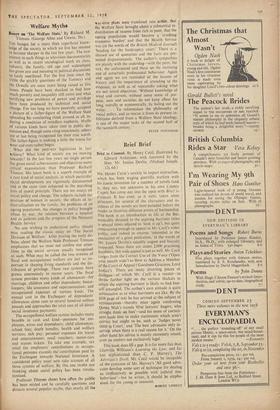Welfare Myths
'Fasant on 'The Welfare State.' By Richard M.
Titmuss. (George Allen and Unwin, 20s.) THE hunger for a more than superficial know- ledge of the society in which we live has seemed to become sharper in the last few years. The new interest in such things as television dOcumentaries as well as in recent sociological work on class, industry, the family, old age and widowhood has given zest and meaning to political discussions so lately moribund. For the first time since the 1930s the prickly questions of the Tawneys and the Orwells are once more being raised as live issues. People have been shocked to find how much poverty and inequality still exists and what terrifying new problems of power and privilege have been 'produced by technical and social change. For too long we have passively accepted a picture of a father-figure of the Welfare State spreading his comforting cloak around us all, in- ducing a condition of mindless euphoria. Myths of various kinds have taken root in public dis- cussion and, though some cling tenaciously, others are at last being recognised for their true worth. The father-figure is looking a little the worse for wear and even rather bogus.
What did the post-war legislation in fact achieve? What kind of society are we moving towards? In the last few years no single person has given social achievements and objectives more critical examination than Professor Richard Titmuss. His latest book is a superb example of a rare kind of social analysis, in which particular social developments are rigorously documented and at the same time subjected to the searching tests of moral principle. There are ten essays on social policy and change, The subjeCts include the position of women in society, the, effects of in- ,dustrialisation on the family, the problems of an ageing population, the changes in policy brought about by war, the relation between a hospital and its patients and, the progress of the National Health Service.
No one wishing to understand policy should miss reading the classic essay on 'The Social Division of Welfare.' After tracing the early de- bates about the Welfare State Professor Titmuss emphasises that we must not confine our atten- tions to the social services usually recognised as such. What may be called the two systems of fiscal and occupational welfare are just as im- portant in shaping living standards and the dis- tribution of privilege. These two systems have grown enormously in recent years. The fiscal system provides many kinds of allowances—for marriage, children and other dependants; house- keepers; life assurance and superannuation; and occupational expenses of various kinds. The annual cost to the Exchequer of dependants' allowances alone runs to several hundred million pounds and approaches the total cost of all direct social insurance payments.
The occupational welfare system includes many benefits in cash and kind—pensions for em- ployees, wives and dependants; child allowances; school fees; death benefits; health and welfare services; sick pay; personal expenses for travel and entertainment; meal vouchers; motor-cars and season tickets. To take one• example, tax relief for employers' contributions to occupa- tional pensions exceeds the'contribution paid by the Exchequer towards Natiorial Insurance. A considered policy must now take account of all three systems of welfare. By this one stroke our thinking about social policy has been revolu- tionised.
Professor Titmuss shows how often the public has been misled and he carefully questions and dissects several popular myths, that nearly all the
war-time plans were translated into action, that the Welfare State brought about a substantial re- distribution of income from rich to poor, that the ageing population would become a 'crushing economic burden' and that the Health Service was (in the words of the British Medical Journal) 'heading for the bankruptcy court.' There is a shrewd use of quotation and the facts are pre- sented dispassionately. The author's sympathies are plainly with the underdog—with the poor, the sick, the unfavoured and those on the receiving end of autocratic professional behaviour. Again and again we are reminded of the lessons of history and the importance of attending to the evidence, as well as of repeatedly asking what are our social objectives. 'Without knowledge of wind and current, without some sense of pur- pose, men and societies do not keep afloat for long, morally or economically, by baling out the water. . . . To reformulate the philosophy of social policy, and to rescue it from its present in- hibitions derived from a Welfare State ideology, is one of the major tasks of the second half of the twentieth century.'
PETER TOWNSEND


































 Previous page
Previous page